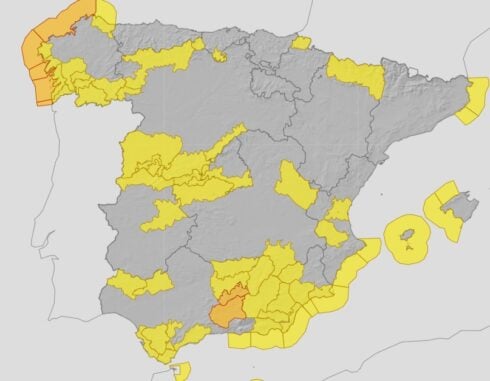SPAIN’S longest-established British newspaper correspondent has called for an MP for the Costas.
Giles Tremlett, who has been the Guardian’s man in Madrid for 20 years, has suggested Britain should follow France in introducing expatriate seats into its parliament.
Although Britons in Spain still have the right to vote in the UK, having a dedicated MP would mean their problems, such as local housing laws or the environment, would be taken more seriously back home, he claims.
An alternative would be to allow Britons to vote in local Spanish elections, he suggests.
This, however, is not an option favoured by Spain or any other European country.
France is set to introduce 11 new constituencies from around Europe in 2012.
They will include MPs for the French living in Spain, England and Ireland.
Click here to read more News from The Olive Press.






Obviously Giles Tremlett has been taking too much sun this summer if he thinks that having British MP’s based here would be to the advantage of ex-pats. Why should it? He states that having a dedicated MP here would mean “their problems would be taken more seriously “back home”? What an indictment that is from a journalist!! How patronising can he be? FIRSTLY a) SPAIN is now my HOME b)Given the standard of your average ‘out for themself – look after number 1 – Corrupt – British MP I don’t think HE or SHE would be any more interested in helping anyone here in Spain than the UK,less in fact because they would have a busier Social Life and nothing but nothing would stand in the way of that!
Perhaps as a journalist Señor Tremlett should do more research. In Malága province at least (which includes most of the Costa del Sol), foriegn nationals who own property here do have the right to vote in local elections, whether or not they are residents, as well as to stand for election as councillors.
PS we also voted for our Euro MP
I should also add that I enjoyed S Tremlett´s book Ghosts of Spain immensely. But as an expat who´s chosen to live and become resident here, I feel that by doing so I have chosen to embrace the Spanish way of life, learn the language and become part of the community. I do not believe I have the right to claim any special previledges because I am a British national.
Hello
Well done to the OP for picking up this story, which raises some important issues.
If you’re interested, you can read the original article (Give a Commons seat to the member for Costa del Sol, 1 November) by Tremlett at http://www.guardian.co.uk/commentisfree/2009/nov/01/expats-deserve-mps
Following its publication, the Guardian website was inundated with posts and the entry was closed after 118 comments.
Unfortunately many of the posts were very negative. As a British-born man who worked his entire career in the UK, but who has now, as an early retiree, decided to live in Spain, I was shocked by the many ill-informed and vitriolic comments posted there.
If you read Tremlett’s original article, he makes an excellent and valid point about him and countless other British residents (about 1 million in Spain alone) who reside abroad being disenfranchised. Unfortunately the proposed solution of diaspora MPs is flawed.
As a part-time, freelance journalist and 40-year-long hispanophile, I admire Tremlett’s perceptive and largely accurate writing. His book “Ghosts of Spain” is outstanding.
I’m afraid the “abuse” that has been hurled at him on the Guardian website for daring to raise an extremely important issue is typical of the garbage I regularly come across in English-language newspapers and on their websites down here in southern Spain, eg this very website and the Euro Weekly News (Leapy Lea and his Daily Mail-reading acolytes who write in to support his racist and anti-British rantings).
As far as I’m concerned the volley of criticism aimed at “ex-pats” – no, we’re actually immigrants, and uninvited guests, to boot – is all about envy and small-mindedness.
Although English-born, I am a fluent Spanish and German speaker. As a result, I am blessed with three separate social lives related to each language group, all of which I find fascinating, albeit different. Within those groups, most people, irrespective of their nationality, are mono-lingual. But I don’t think any the less of them. I happen to be a trained linguist; they are trained carpenters, electricians, police officers, sales executives, hoteliers, all skilled in their own fields. Many of them have tried to integrate and learn Spanish and are successful to varying degrees. But they are all committed to living here, are resident, on the padrón (electoral roll) and, on the whole, pay their taxes here.
There are indeed stereotypical British ex-pats and I chuckled at Frank Little’s five definitions on the Guardian website thread, because I know people who fit each of the categories. Unfortunately, there wasn’t one into which I and many of my friends would fit.
Nevertheless, the answer to this representation problem is quite simple and was identified by many posters. If, as an EU national, you are tax resident in another EU country, you should have the right to vote in all elections, local, national and European in that country, and not in the country of your birth. Simple, straightforward, no argument.
The sooner Brussels takes note of this and changes the law to remove the current anomalies, the better. And as for those who criticise, on the grounds of envy, those of us who have legitimately moved countries within the EU, well, perhaps we should just ignore them.
Paul Whitelock, Ronda, Spain
Interesting,Paul, and thanks for the link.
I too was pretty shocked by the response, and the apparent ignorance of the Guardian readers who choose to view those of us who have chosen to live in Spain through the eyes of tabloid TV programmes. I would have thought most Guardian readers to have a more critcal outlook (naive I know)
We live in a small Spanish village where no English is spoken. We speak Spanish and have Spanish friends, as do all the other ´expats´ we know (including the few who have holiday homes here). I accept that the 5 stereotypes exist, but they do not reflect the British people I know, most of whom work here, take an active interest in Spanish life and politics involve themselves in the community and voted in local and EU elections
The article is partially right, many town halls are afraid of allowing foreigners to vote, as it could change the “statu quo” that they have enjoyed, mainly in the case of cities governed by the same political party for the last 30 years (no need of samples). However, it is the foreigners’ fault. They should go to the Town Hall and register in the padron (being empadronado), and also request for their right to vote in the local and european elections (become member of the polling lists, census). This will enable them to vote in the goverment of their city hall, which is what they know most. Complaining at the bars and social meetings is very nice but useless. Enforcing our own rights is the only way to be respected.
And, of course, I also agree that all legal residents should be able to vote in the country where they are paying taxes. “If you pay, you decide” should be the logo of this campaing. But some people believe that language should also be a condition. How can you have the knowledge of a country if you don’t speak their language? In general, all foreigners should learn the language of the country they have choosen to live in, that’s the best for them.